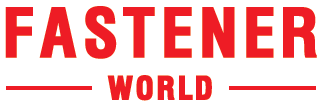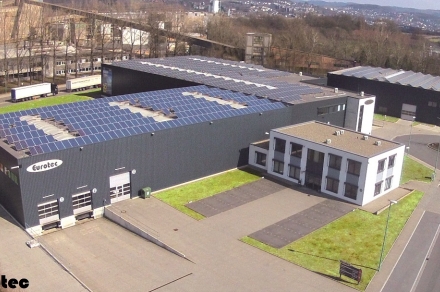Interview with President Alex Chen of Sumeeko Industrial Co., Ltd.
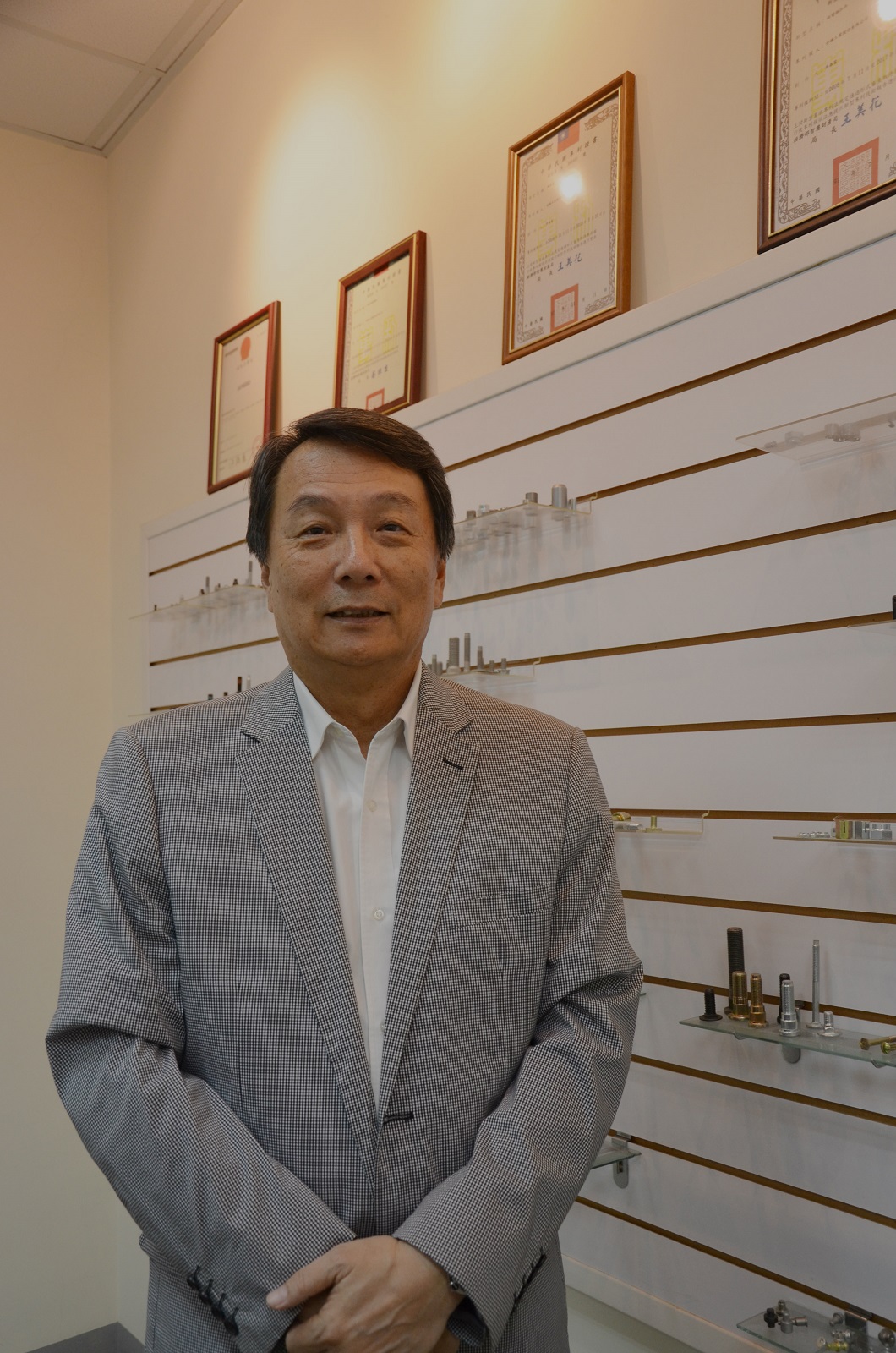

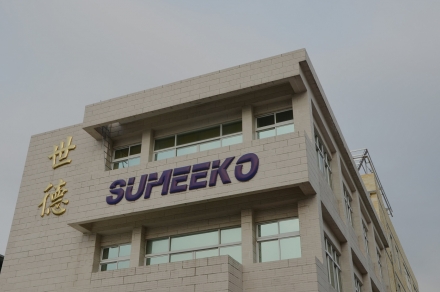
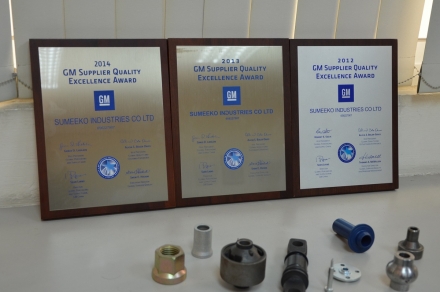

1. Please tell us about the brief history and mission statement of Sumeeko?
When I was 26, I was hired by San Shing Hardware (the largest steel nut manufacturer in Taiwan at that time, now “San Shing Fastech”) to work for its IT division, where I successfully led San Shing to become the first Taiwanese fastener company using computerized management. Within a year I was again promoted to be the president of a new subsidiary Wingtone Industrial Co., Ltd., founded by San Shing, responsible for roller chains business.
3 years later (1982), my parent company San Shing faced a difficult financial situation, so I was required to take the president position in the forming division of the parent company with a goal of stabilizing the company’s operation. In 1985, I was moved to be the president of “Yao Kan Enterprise (out of business)”, which was co-founded by San Shing and Tong Guang in correspondence with the “Big Traders” policy of Taiwanese government for order sharing to avoid destructive competition. However, the uneven interest distribution finally resulted in discord in the board of directors. I left Yao Kan Enterprise thereafter in 1988 and left San Shing.
In the same year when Sumeeko was founded, I was wondering what I could do and had a thought that there were still a lot of aspects in the fastener industry to be discovered and I shouldn’t be a competitor to my previous company, so the main goal of Sumeeko was set to be “providing solutions and manufacturing specialty products”. The focus on “quality over production” and “calculating the defective rate at ppm rather than at %” both helped link Sumeeko to an image of good quality.
2. Why did you start business from the automotive fasteners area? How did you find a way to cooperate with leading car manufacturers?
In terms of the current ideas of “Red Ocean” and “Blue Ocean”, Taiwanese fastener industry before 2000 basically focused on “volume”, so being in the period, Sumeeko proud of its quality should try hard to stay away from the competition of the “Red Ocean” and be in the competition of “Blue Ocean”. This is why the automotive industry with higher quality requirement soon became Sumeeko’s first target.
In fact, before Sumeeko gained the first order from a car manufacturer, it had done lots of efforts in re-adjusting its quality control, financial management, staff deployment, and marketing strategy systems (especially the financial management). Sumeeko is always conservative in its financial manipulation and will only invest in a debt-free way. For car manufacturers, this can help them reduce the risk of long-term supply to the lowest level.
We received GM’s first order in 2008. Now we are not only a T1 supplier for GM and Chrysler, but also a T2 supplier for Ford, Honda, Toyota, Nissan, Benz, BMW, etc. What’s worth mentioning is that Sumeeko has been awarded GM Supplier Quality Excellence Award for the 3rd straight year. I think that this also means Sumeeko’s quality has been widely recognized in the automotive industry. At the same time, we are also very happy that our products are also well received in Taiwan. Our current cooperation with a globally leading electric vehicles maker resulted mainly from the cooperation with GM, which in U.S. market has been well known for its high quality for many years.
3. After Sumeeko received the order from the electric vehicle maker, we began to see the company being traded over the counter in 2011, and thereafter, its sales continued to climb year after year and the company had to set up a new Pingtung-based factory to keep up with the schedule of the order book. In terms of the good results year after year, how does President Chen feel about this success? The expectation and future plans for Sumeeko? How will the company make the most of its capital and talents?
A good factory site is really hard to locate and the return on investment cannot be always cost-effective. In spite of this fact, Sumeeko did luckily find a 9,917 sq. meters ready-for-use plants on a 16,528 sq. meters land in Pingtung Export Processing Zone, saving 6/7 of the expected total cost, all of which would later reflect on the future production cost of Sumeeko and the factory will become an important manufacturing site for continuous development.
4. That the automotive industry currently focuses on environmental protection and lightweight also becomes a critical challenge for fastener/component suppliers (the development of electric vehicles is just one symbolic example of environmental protection). How do you think the fastener industry should do to face the “lightweight” challenge (incl. selection, R&D, inspection, assembly, and use of materials) and how it should cooperate with car manufacturers?
“Structure” and “materials” are two major areas in terms of lightweight. For example, we can select better materials to enhance the strength and satisfy the lightweight demand with light metal and composite materials. This is always what Summeko is doing in cooperation with car manufacturers and these two major areas are being done simultaneously.
I think this is also the most valuable and competitive part of Taiwanese fastener manufacturers. Taiwan may not be the best in material technology, but its use of materials has reached to international standards. Following this statement, we even think that the production cost of China is higher than of Taiwan, though materials in China are cheaper, but the cost of manufacturing high quality fasteners can be also influenced by other factors. As a result, Taiwanese products should be still quite competitive.
5. In recent years, European/U.S./Japanese fastener suppliers have begun to set up their operations in Latin America, ASEAN, or China, in order to provide instant service to local car assembly plants as well as develop the local automotive fastener market. Unfortunately, there is still not a very well-established automotive industry in Taiwan to support these suppliers, greatly increasing the difficulty for Taiwanese automotive fastener suppliers to market their products. What is Sumeeko’s marketing strategy? What is the key factor for you to enter the supply chain?
The important factor of marketing is “quality”. If the product is good, customers will come for you. For an export-oriented company, shipping products to where customers really need is quite natural, so wherever a car manufacturer’s plant is, products can be shipped there at all times. Sumeeko even has its own warehouses in many areas around the world. The concept of global service is the primary for the company to be more international.
6. It has been H2 2015, and the entire demand appears to slightly decline and the growth appears to slow down. What is your opinion about this? Going forward, what do you think the fastener industry will be in 2016? Any new challenge in 2016? How will you adjust your production, sales, and marketing focus? Future investment and scale?
As of the end of Sep. this year, Sumeeko still reported growth. When the recession appears, customers will always reduce their budgets and releases inventory; as a result, companies focusing on mass production will suffer the greatest influence. However, the demand still exists. In a recessional period, companies focusing on specialty products can still receive stable orders. For example, Sumeeko still received 3 orders for considerable quantities this year.
“The global supply system” is Sumeeko’s most significant feature. We have warehouses in USA, Europe, Japan, Taiwan, and China. This year we will continue to reinforce our supply in various markets.
7. As there will be more non-manufacturing costs of fasteners (e.g., antidumping measures, patents & license, international certification, and marketing) in future fastener export, how do you think the fastener companies in different scales should cooperate with each other to maintain the competitive edge of Taiwanese fastener industry? Is it feasible to do with merger and acquisition?
Taiwanese fastener industry is undoubtedly competitive; however, I must say that, instead of M&A and other kinds of cooperative ways, Taiwanese industry is characteristic of the fact that everyone wants to be the leader and can hardly accept being led by others. This is also the reason why ‘Yao Kan Enterprise” became out of business.
If everyone in the Taiwanese industry can accept to be led by experts or leading companies in certain areas and make the most of resources, I believe the entire industry will become better. We should not use competition to replace others, as the integration of the industry is beneficial to keep talents in the industry and the loss of talents will to some extent cause damage to a company.
8. What do you think is the most important factor to maintain the sustainable operation of a company?
The “Sume” in our name “Sumeeko” means “clarity” in Japanese and the “clarity” has a meaning similar to the “honesty” in Chinese. Sumeeko hopes to become a company that treats customers with honesty and that shows truthful interaction among all its staff, which will consolidate our relationship with customers.
I think that “clarity” and “honesty” are not only the elements for a company, but also what a person should have. I do not seek “sustainability” on purpose. To be honest, I don’t care about what will happen in a hundred years, but I do care about how we can do the best right now and share interests with the staff and shareholders. In the future, this company will be handed over to professional managers and how to keep the talents in the industry generation by generation will also become the foundation for Sumeeko’s sustainability.
9. Who do you want to cooperate with in the future supply/demand market? Any suggestion for them?
No matter it is a car manufacturer or an OEM, as long as it cares about quality, Sumeeko will be its good partner, as we are a company that provides quality solutions and specialty fasteners.
10. Do you have anything else to say about the fastener industry?
The shutdown of many large importers in recent years did harm many Taiwanese fastener companies a lot. I think the industry should establish a “Company Reputation Alert System” to reduce the risk in trade. On the other hand, recruiting talents from other corporations and moving from one firm to another are common reasons that affect the industrial development. But we all believe that company owners will not put these persons moving from another firms in important positions as the trust is not well built between them. However, if the staff can be from a well-established pre-work training program provided by the government or school, or even get the certificates that can help gain benefits from the employer, they will be all good ways to do. Third, the upgrade of materials is another one that needs improvement, as the competitive edge of Taiwanese fastener industry is sometimes affected by the lack of high-end materials. The last point is, Taiwan is very good at manufacturing. Sometimes when we produce a very good product, but is not allowed to be exported to a certain market due to tariff barriers. That will be really frustrating. As a result, the government is responsible for keeping the trade approaches open and should also make its nationals to broaden their horizons.

Subscribe


